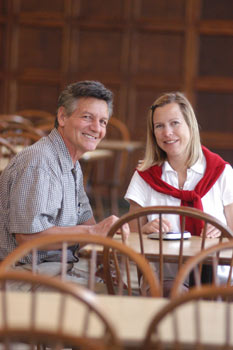A decade of reading, writing, and helping
For 10 years, CALS Project tutors have worked with staffers to improve their basic skills
![]()
| 30 April 2003
| |  Juan José Fuentes, left, a dishwasher at the Clark Kerr Campus, has greatly improved his English-speaking skills, thanks to the help of tutor Erika Genolio. The two were paired through the campus’s CALS Project program. Peg Skorpinski photo |
In his native Honduras, Juan José Fuentes worked for a large tobacco company, managing their crop production. But he left that job because he no longer wanted to support the sale of such a harmful product. He then started his own vegetable-growing business, but renting land was so expensive there that it was difficult for him and his wife, a schoolteacher, to make ends meet.
At the suggestion of his father-in-law, who lives in Pittsburg, Calif., the couple came to the Bay Area in 2000 to seek out new career opportunities. But because both were unable to speak English, there was a limit to the kinds of jobs they could obtain. Currently, these two professionals are washing dishes for the campus’s Housing and Dining unit.
Eager to move into higher-level campus jobs, Fuentes is taking advantage of a special program sponsored by the Office of Human Resources’ Employee Development and Training Program. The CALS Project helps employees improve their speaking, reading, and writing of English, as well as basic math skills, by matching them with tutors, either individually or in small groups.
Last fall, Fuentes applied for the program and joined a small group taught by Erika Genolio. Because of the variety of native languages spoken by students in the class — including Spanish, Chinese, and Vietnamese — Genolio uses pictures, role-playing, games, demonstrations, and other techniques to teach English.
“For example, since many students in that class work in food service,” she says, “I brought in several kitchen utensils and different types of food and we practiced identifying and pronouncing their names in English.”
The approach has worked well for Fuentes, whose English-speaking skills have improved dramatically. “I love to talk, so when I first got here and couldn’t communicate with others, it was very frustrating,” he says. “It’s difficult to learn, especially at my age, but I’m working very hard to improve.”
Happy birthday, CALS Project! |
Tutoring has also helped Genolio achieve her career goal of becoming an ESL teacher. She is currently enrolled at UC Extension, and the time she spends working with CALS Project students counts as credit towards the completion of her certificate.
“It’s been very helpful to take what I’m learning in the classroom and apply it in a real-life situation,” she says. “And the students from the CALS Project are wonderful. They’re very motivated and energized about learning, which makes it a lot of fun.”
A familiar story
Fuentes’s and Genolio’s story is a familiar one to Jane Griswold, long-time
manager of the CALS Project. The program, which marks its 10th anniversary
this month, has trained more than 500 volunteer tutors and assisted nearly
600 learners since its inception.
“Learners come to us for a number of reasons,” she explains. “Some want to move into new jobs, like Juan, while others want to pass their U.S. citizenship test, improve their presentation skills, or just be able to read the daily newspaper. The tutoring helps give them confidence to pursue these goals.”
Volunteer tutors — who come from staff and faculty ranks, as well as from off-campus — must complete five three-hour training sessions before they can begin teaching. No experience is necessary, but the ability to be patient and flexible are important qualities for success, Griswold adds. Volunteers are asked to perform at least six months of tutoring, and to teach one or two hours per week.
“I know this seems like a big chunk of time, but it’s such an enriching experience, for tutors and learners alike,” she says. “And because participants from all corners of the university come together and interact, it really builds a sense of community on campus.”
The next set of tutor-training sessions begins June 4. Those interested in volunteering can contact Griswold at jgris@uclink.berkeley.edu or 643-5280.

